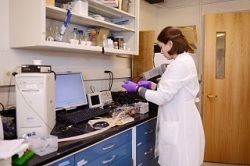 |
| A Dartmouth nanoparticle lab--Courtesy of Dartmouth's Geisel School of Medicine |
At the Dartmouth-Hitchcock Norris Cotton Cancer Center in New Hampshire, researchers have found a way to use nanoparticles to deliver drugs that can "wake up" the immune system and fortify its natural response to harmful cancer cells in the body.
Often, the immune system can be knocked out of commission by a tumor and doesn't recognize the offending cells. According to the cancer center, by stimulating the immune system with a combination therapy of antibodies, drugs, vaccine-type viruses and metals delivered to cancer cells with tiny nanoparticles the therapy can give the body a leg up, even against drug-resistant tumors.
"Our lab's approach differs from most in that we use nanoparticles to stimulate the immune system to attack tumors and there are a variety of potential ways that can be done," lead researcher Steve Fiering said in a statement. "Perhaps the most exciting potential of nanoparticles is that although very small, they can combine multiple therapeutic agents."
The scientists are also looking to combine highly targeted energy with the drug-delivering nanoparticles to spur the immune system into action, effectively using either magnetic energy, infrared or radio waves to heat metallic particles delivered by the vehicles. This can create a target for the immune system to attack the cancer cells while avoiding the healthy ones.
"Now that efforts to stimulate antitumor immune responses are moving from the lab to the clinic, the potential for nanoparticles to be utilized to improve an immune-based therapy approach is attracting a lot of attention from both scientists and clinicians. And clinical usage does not appear too distant," Fiering said.
- here's the release